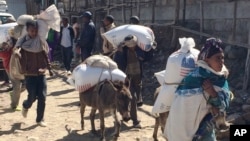Save the Children charity said Friday it had raised less than a third of what it needed for its campaign to help Ethiopia cope with drought which has left 10.2 million people critically short of food.
Experts say the drought is worse than the one in 1984, when years of conflict followed by the failure of rains led to a famine that killed up to a million people.
This time, Ethiopia is better positioned to respond after rapid economic growth, but still risks being overwhelmed as it digs into strategic food reserves.
"The scale of the need is really huge and has outstripped the Ethiopian government's ability to do this on their own," Save the Children President Carolyn Miles told Reuters from the United States after a visit to Ethiopia.
The drought has mainly been blamed on El Nino, a weather pattern causing rainfall to decline in some areas of the world and causing floods elsewhere.
Save the Children has been seeking $100 million for the next 12 to 18 months, but so far has only $30 million.
Awareness a challenge
"One of the hardest things right now is getting the awareness up," Miles said.
The U.N. World Food Program is also facing a funding shortfall. It needs $480 million to help meet the needs of about 7.6 million of 10.2 million at risk in coming months, but has raised just under $60 million, a WFP official said.
Save the Children has ranked Ethiopia a Category 1 emergency, like the Syrian crisis.
Miles said the Syrian conflict, rumbling on for five years, had "really stretched the humanitarian system," making it harder to find international support for Ethiopia.
Ethiopia was showing more openness than in the past in publicizing the crisis, which could help.
"But because there is so much stress and strain on the humanitarian system, I am not sure how much of a difference that will make," she said.
Ethiopia was using its food reserves cautiously to make them last, Miles said. Some families received rations for not all of their members, while handouts were often made only every other month.
Almost 5.8 million of those facing critical food shortages are children, with 400,000 severely malnourished or close to it, making them highly susceptible to pneumonia or malaria, Miles said.
"We really want people to act now when we can actually save those children's lives," she said.






